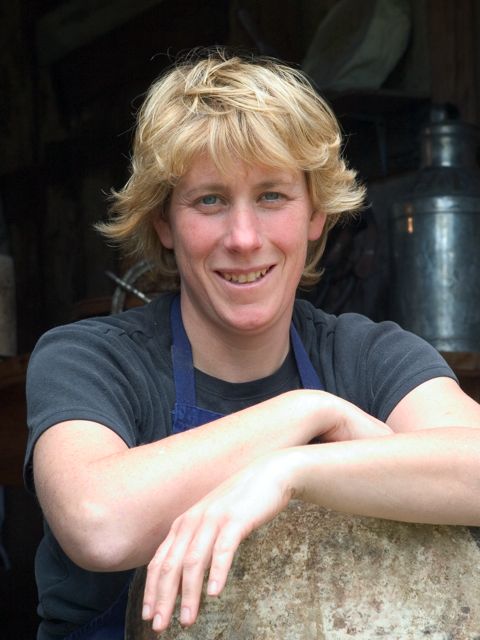
reference-image, l
(article, Jennifer Meier)
p(blue). When British native Kate Arding got her first job working in a cheese shop (London's renowned Neal’s Yard Dairy), she knew nothing about cheese except that she liked eating it. Today, Arding is a cheese judge and a consultant specializing in small-scale cheese production, revered for her cheesemaking and affinage, or cheese-aging, skills. p(blue). In 1997, Arding moved to California to help establish Cowgirl Creamery, an artisanal cheesemaking facility and retail shop started by two Bay Area chefs. Most recently, Arding helped found Culture, the first consumer magazine devoted entirely to cheese. How did you first become interested in cheese? My uncle had a business that sold mustards, and I started working for him. One day I made a delivery at Neal’s Yard Dairy. There was floor-to-ceiling cheese, and it was a hive of activity. The first thing they did was hand you a sample of cheese, and they talked to you about it in a friendly way. I was smitten. When you moved to northern California in 1997, how did the artisanal-cheese industry in the United States compare to England’s? England was trying to preserve the traditions of cheesemakers, and the United States was trying to establish them. When I started working for Cowgirl Creamery, making artisanal cheese was an embryonic movement. [%image kate float=right width=350 caption='Kate Arding founded Culture, the first consumer magazine devoted entirely to cheese.'] Do you think the artisanal-cheese industry in the United States has peaked? It is nowhere near peak. It’s grown enormously and a lot can still happen. I enjoy helping to cultivate what’s happening in the second generation of new cheesemakers on the scene. There is a lot of new energy, there is increased knowledge sharing. I’ve seen enormous changes in quality since 1997. It’s astounding. The movement is symbiotic. To make decent cheese, you need wholesalers and retailers who understand the cheese. Retailers and producers need each other. What advice do you have for cheesemongers? When I sold cheese for Cowgirl Creamery, my philosophy was that we had to make it all about having relationships with our producers. If you’re a cheesemonger, you’re a conduit. You need to tell the story, then describe the cheese. The flavor of a cheese changes. Be honest about it. With the customer, it’s about trust. What advice do you have for someone who wants to make cheese? When someone tells me they want to be a cheesemaker, the first thing I ask them is, “Do you like to clean?” Because there is a lot of cleaning involved. It’s hard work. There are many good classes offered now, and it’s important to learn about chemistry and sanitation. The classes are good, but there's no substitute for getting your hands dirty. Just go and do it. Apprentice. That’s the way to understand if you’re cut out for it. What sort of skills does someone need to judge cheese competitions? To be a judge, you need to develop your palate, and you need to have a familiarity with the flavor profiles of cheese types. For example, you need to know all the characteristics of a bloomy-rind cheese, so you can dissect each component to find flaws. When you’re judging cheese, what are you looking for? As a judge, I’m looking for things like: Is it too high in acidity? Is the texture weak or compromised? Is the salt level off? Being a judge is both scientific and sensory. Cheesemakers need honest feedback from an honest palate. I try to articulate specific flavors and how to adjust bad qualities. At the American Cheese Society conference this year, there were 1,300 entries in the cheese competition you judged. Did you have to taste all of them? No. The entries are divided into categories. I probably ended up tasting about 160 cheeses. What's the most difficult part of judging cheese? It’s hard to avoid palate fatigue. Feta is especially hard — the salt! You have to focus and take breaks. Eat fruit and plain baguette. Know when your palate is tired and take it slow. Some judges spit out the cheese, but I don’t, even if the cheese is unpleasant, because you have to experience it so you can be exacting as to why it’s bad. Why are organizations like the American Cheese Society important? Education and collaboration. Cheesemakers are movers and shakers who have blazed a trail and have a lot of clout in terms of farming, milk production, and how we eat. p(bio). Jennifer Meier is a California-based food writer and culinary-school graduate. She shares her thoughts and recipes on her blog, The (modern) Busy Girls’ Cookbook.

reference-image, l

kate, l